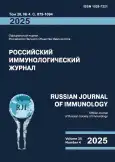Системная взаимосвязь воспалительных, гормональных и метаболических маркеров у женщин с синдромом поликистозных яичников
- Авторы: Азизова З.Ш.1, Мусаходжаева Д.А.1, Рузимуродов Н.Ф.1, Олимова Н.И.2
-
Учреждения:
- Институт иммунологии и геномики человека Академии наук Республики Узбекистан
- Бухарский государственный медицинский университет
- Выпуск: Том 28, № 4 (2025)
- Страницы: 1055-1060
- Раздел: КРАТКИЕ СООБЩЕНИЯ
- URL: https://journals.rcsi.science/1028-7221/article/view/333269
- DOI: https://doi.org/10.46235/1028-7221-17224-SRO
- ID: 333269
Цитировать
Полный текст
Аннотация
Синдром поликистозных яичников (СПКЯ) представляет собой одно из наиболее распространенных эндокринных расстройств у женщин репродуктивного возраста и характеризуется разнообразными клиническими проявлениями, включая нарушение овуляции, гиперандрогению, а также метаболические изменения, такие как инсулинорезистентность и ожирение. В последние годы все больше внимания уделяется роли иммунных факторов и системного воспаления в патогенезе данного синдрома. Целью настоящего исследования явилось определение уровней антимюллерова гормона, гонадотропинов, провоспалительных цитокинов, показателей углеводного обмена и индекса инсулинорезистентности у женщин с различными клиническими формами СПКЯ, в зависимости от характера менструального цикла. В исследование были включены 86 женщин репродуктивного возраста, которые были разделены на четыре группы: контрольную (женщины без нарушений менструального цикла) и три группы пациенток с СПКЯ, стратифицированные по типу менструального нарушения: регулярный цикл, олигоменорея и аменорея. У всех участниц определялись уровни антимюллерова гормона, фолликулостимулирующего и лютеинизирующего гормонов, глюкозы, инсулина, а также провоспалительных цитокинов – IL-6, TNFα и IL-17А. Рассчитывался индекс инсулинорезистентности. Полученные данные показали достоверное повышение уровней всех изучаемых гормональных и иммунных показателей у женщин с СПКЯ по сравнению с контрольной группой, с наибольшими изменениями в группе с аменореей. Результаты исследования подтверждают наличие системной взаимосвязи между воспалительными, гормональными и метаболическими нарушениями у женщин с СПКЯ. Провоспалительные цитокины могут рассматриваться в качестве потенциальных биомаркеров тяжести заболевания, а их комплексная оценка наряду с гормональными и метаболическими показателями может способствовать улучшению диагностики и индивидуализации терапии при данном синдроме.
Полный текст
Открыть статью на сайте журналаОб авторах
Зухра Шухратовна Азизова
Институт иммунологии и геномики человека Академии наук Республики Узбекистан
Автор, ответственный за переписку.
Email: zuhra_0203@list.ru
ORCID iD: 0009-0009-8723-3002
к.б.н., старший научный сотрудник лаборатории «Иммунология репродукции»
Узбекистан, г. ТашкентДилорам Абдуллаевна Мусаходжаева
Институт иммунологии и геномики человека Академии наук Республики Узбекистан
Email: dilym@mail.ru
д.б.н., профессор, заведующая лабораторией лаборатории «Иммунология репродукции»
Узбекистан, г. ТашкентНодир Фазлиддинович Рузимуродов
Институт иммунологии и геномики человека Академии наук Республики Узбекистан
Email: ruzimurodov.2019@mail.ru
ORCID iD: 0000-0002-5194-1113
д.м.н., ведущий научный сотрудник
Узбекистан, г. ТашкентНасиба Исматуллоевна Олимова
Бухарский государственный медицинский университет
Email: zuhra_0203@list.ru
к.м.н., самостоятельный соискатель
Узбекистан, г. БухараСписок литературы
- Azziz R., Carmina E., Chen Z., Dunaif A., Laven J.S., Legro R.S., Lizneva D., Natterson-Horowtiz B., Teede H.J., Yildiz B.O. Polycystic ovary syndrome. Nat. Rev. Dis. Primers, 2016, Vol. 2, 16057. doi: 10.1038/nrdp.2016.57.
- Chakraborty P., Goswami S.K., Rajani S., Sharma S., Kabir S.N., Chakravarty B., Jana K. Recurrent pregnancy loss in polycystic ovary syndrome: role of hyperhomocysteinemia and insulin resistance. PLoS One, 2013, Vol. 8, no. 5, e64446. doi: 10.1371/journal.pone.0064446.
- Dewailly D., Barbotin AL., Dumont A., Catteau-Jonard S., Robin G. Role of Anti-Müllerian Hormone in the Pathogenesis of Polycystic Ovary Syndrome. Front. Endocrinol., 2020, Vol. 11, 641. doi: 10.3389/fendo.2020.00641.
- Di Pietro M., Pascuali N., Parborell F., Abramovich D. Ovarian angiogenesis in polycystic ovary syndrome. Reproduction, 2018, Vol. 155, no. 5, pp. R199-R209.
- Franks S., Stark J., Hardy K. Follicle dynamics and anovulation in polycystic ovary syndrome. Hum. Reprod. Update, 2008, Vol. 14, no. 4, pp. 367-378.
- González F. Inflammation in Polycystic Ovary Syndrome: underpinning of insulin resistance and ovarian dysfunction. Steroids, 2012, Vol. 77, no. 4, pp. 300-305.
- Kuang H., Duan Y., Li D., Xu Y., Ai W., Li W., Wang Y., Liu S., Li M., Liu X., Shao M. The role of serum inflammatory cytokines and berberine in the insulin signaling pathway among women with polycystic ovary syndrome. PLoS One, 2020, Vol. 15, no. 8, e0235404. doi: 10.1371/journal.pone.0235404.
- Legro R.S., Arslanian S.A., Ehrmann D.A., Hoeger K.M., Murad M.H., Pasquali R., Welt C.K. Diagnosis and treatment of polycystic ovary syndrome: an Endocrine Society clinical practice guideline. J. Clin. Endocrinol. Metab., 2013, Vol. 98, no. 12, pp. 4565-4592.
- Mazloomi S., Barartabar Z., Pilehvari S. The Association Between Increment of Interleukin-1 and Interleukin-6 in Women with Polycystic Ovary Syndrome and Body Mass Index. J. Reprod. Infertil., 2023, Vol. 24, no. 1, pp. 26-34.
- Pigny P., Jonard S., Robert Y., Dewailly D. Serum anti-Mullerian hormone as a surrogate for antral follicle count for definition of the polycystic ovary syndrome. J. Clin. Endocrinol. Metab., 2006, Vol. 91, no. 3, pp. 941-945.
Дополнительные файлы







